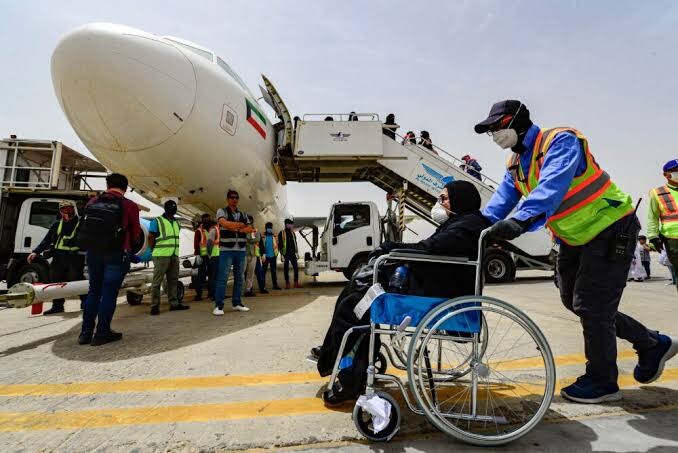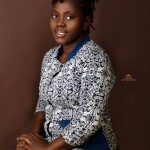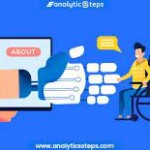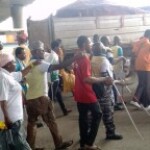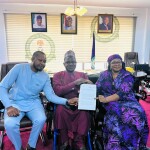When the chief enforcer runs errands for aviation’s big birds defying Nigeria’s disability law—that’s meddlesomeness by any other name.
By Elijah Olusegun
David James Lalu might be a regular flier. And most of the times he hops in planes around Nigeria might have to do with his NCPWD job. The commission likes to chalk up its executive secretary’s travels expenses as ‘mass awareness campaigns’ in the budget. Over N112 million the federal government approved is going for that in 2024. That is about N31 million (38 percent) higher than the 2023 figure for the same line item.
Lalu can then ship along with him a coterie of aides, especially Tim Tinat, his personal assistant and board secretary of the World Association of Sign Language Interpreters. Aides like Tinat are a necessity for him, but a privilege many of Lalu’s cluster members may never have.
Sule Akinremi, zonal co-ordinator, the Nigeria National Association of the Deaf (NNAD), southwest, suspects this privilege as elitist.
In any case, the failure of the airlines plying Nigeria’s airspace to provide sign language interpreters, as the Discrimination Act 2018 demands, frustrates many. The Centre for Ability Rehabilitation and Empowerment (CARE) has run into a lot of head wind in its drive to entrench accessibility in Nigeria’s aviation. The Nigeria Civil Aviation Authority (NCAA) boss Nuhu Musa had to own up to CARE’s founder Chike Okogwu in 2022—that the aviation policymakers did a bad job of mainstreaming disability in the sector. This has remained one solid brickwall against the disability community in Nigeria. Okogwu, at some point, thought it wise to give up on some of his NGO’s advocacy in aviation. “It’s the commission that is saddled with the responsibility of doing such work,” he told ER in May.
JONAPWD Lagos Chairman and lawyer Lukman Salami believes the airline operators have the responsibility to make aviation accessible to PWDs. Their failure only amounts to impunity—no matter what they serve up as excuses.
Certainly, it’s not about lack of resources. Nigeria’s aviation sector is worth $600 million, and may hit $1.9 billion by 2029, Statista says. That’s if accessibility depends on market size. The training and other up-skilling aspects can’t even gobble up much money, according to the southwest coordinator of the Association of Sign Language Interpreters of Nigeria (ASLIN). “Just basic information to get the interpreters work-ready for the new environment,” Samuel James said in an April interview with ER. In climes where airline operators obey disability laws, the technologies, too, have taken effect, dovetailing into the human roles. He cited the use of Video Remote Interpreting. The VRI enables deaf passengers to connect to a remote sign language interpreter for assistance.
Accessible as that is, impunity hasn’t allowed such assistive technology to catch on yet in Nigeria.
Lalu could also have imagined the disorientation this problem causes regular deaf fliers. And his troubled passion could have been boiling until one of his recent awareness campaigns where it spilled over. Rather than decry the airline operators’ irresponsibility, he declared the commission would bear the burden. “Today, we are taking over a project by deploying our personnel to the major airports in the country to provide necessary support for PWDs,” he said early April.” We will provide some of them with sign language interpreters.”
Nigeria has 22 airports, including six international ones, FAAN says. The project the commission took over is the disability desk at the Nnamdi Azikwe International Airport, Abuja. CARE had initiated it, rigged it up with ambi-lifts, wheelchairs, umbrellas, other assistive devices, and sign language interpreters. Okogwu said the project, Accessible Aviation, started August 2021, and ran for 18 months at the second largest international airport. Other major ones Lalu claimed the NCPWD staffers would cover in other regions would therefore be starting from scratch—without much guiding presence. Despite years of budgeting for regional offices, the commission has never set up any in the six geopolitical zones. Starting and sustaining the job it just landed itself nation-wide, from its Abuja headquarters, will only waste resources.
The Act, in section 14 and its subsections, compels rail, sea, road, and air transporters to provide all accessibility services. Section 15 even gets specific: Any general information shall be translated into the accessible format appropriate to the person with disability.
Since the NCPWD has the mandate to enforce this, Lalu could just be getting above himself with that declaration. Or what is the point in making the commission provide what the law compels service providers to do?
And that decision may muddy the waters of enforcement with advocacy.
Samuel thinks the commission is closer to the community, and might feel their pain so much it’s willing to blur the line. Akinremi denied such closeness, and dismissed the question of an injury to one is an injury to all.
The Lagos JONAPWD chairman, however, insisted the Act, from sections 31 to 50, is clear on the distinction. “The commission is supposed to be run by two statutory authorities: the governing council and the executive secretary,” Salami said. “The Act only empowers the commission to enforce the governing council’s decisions—not for the ES to formulate policies.” He wondered if the absence of the governing council is enough for the NCPWD executive secretary to arrogate decision-making powers to himself.
Okogwu might not entirely differ on the commission’s responsibility to stick to what the Act says. His worry is the semantics. “I don’t like word ‘enforcement’: it sounds too military,” he said. “Historically PWDs are known to use force to get their agenda fast. We want to move away from that—to moral suasion.”
But Lalu acting Johnny-on-the spot for the airline operators has its own blowback, in addition to its illegality. “How many interpreters are they willing to employ?” Samuel said, noting “the logistics of scheduling and positioning interpreters at various airport areas”. The commission budget allocation might not cover such intervention even if Lalu is willing to stretch it thin. The policy, Samuel told ER, will have problem at the implementation level. For him, it looks great on paper, though. Actually, most knee-jerk decisions like this do.
Some of the community members educated enough to know told ER the commission never bounced the idea off them.
“If he actually said it, I don’t think it’s a team work,” Salami said. “Because his team of lawyers would have advised him it’s not his responsibility or the commission’s to embark on such provision of services.”
Akinremi told ER Lalu never founded the policy decision on needs assessment. “How many deaf (Nigerians) patronize the airlines while there are pressing needs in hospitals, police stations, ministries?” The commission might have figured this out had it consulted wide. “My suspicion is the NCPWD services are always in response to discrimination against families of those on top, not for ordinary PWDs like us,” the NNAD chairman said.
Lalu wouldn’t even seek the opinion of ASLIN which coordinates the sign language experts he wants to deploy. Samuel said he wasn’t aware of any of his members working a shift at any airports.
Unlike the deaf cluster, ASLIN is not an organization of persons with disabilities (OPD), anyway.
In Nigeria, the challenge of accessibility in aviation is a respecter of no organization. With all its bona fides as an OPD, CARE has yet to pull off most of its advocacy it started in aviation; it succeeded, though, in crushing the policy forcing PWDs to fly with guides; and it boasts the first ever documented policy push for accessible aviation in Nigeria. But 14 months after conclusion, its €54,610-donor-funded project flagged and ended up a Greek gift to the commission in April. CARE funded it all that while. Okogwu denied it was challenging doing that. “But for it to be more sustainable, we are of the opinion that the commission take over the project,” he told ER. “It’s part of our sustainability plan which we earlier submitted for the project [funding].”
Okogwu said NGOs normally have the responsibility to identify gaps and solutions for the government to intervene. That rings true, especially in the aviation disability project on which the NCPWD is going for broke. He confirmed FAAN had intervened before now, with a disability desk at every airport across Nigeria. Likewise the NCAA. But the commission won’t heed Okogwu’s advice—not to reinvent the wheel again. “From my experience in government, everyone wants to own a project; everyone wants to prove they are working; everyone wants to retire expenditures,” he said. “It’s a major problem of bureaucracy. In the end, the goal will be lost in the crowd. It’s a challenge.”
Lalu, too, knows: in government, it’s easier said than done.
Even in the burst of adrenaline that fuelled his April declaration, the truth still hit him cold. He almost conceded he’d bitten more than he could chew. His emphasis on deploying ‘our small personnel’ revealed that much. He was foreshadowing the disaster lurking ahead of this eye service of an intervention.
The commission didn’t respond to ER request in May for updates and clarifications. No one can tell if the NCPWD staffers, including sign language interpreters, have swung into action now. “I will have to do a rain check to know that,” Okogwu said. The Lagos disability office and the NCPWD will collaborate to set up the two desks for the three terminals in Lagos. He’s not aware of the commission’s strategy for others in Port Harcourt, Kano, and Enugu.
Maybe reality has set in—that the call wasn’t Lalu’s to be made.
“It’s the statutory duty of the airline service providers’,” the lawyer said. “Or at worst that of the regulatory ministry’s, which is the aviation ministry, and, by extension, FAAN or NCAA.”
The disability desk project is the latest the NCPWD has signed on for. Already lying in wait for execution they may never get are a raft of others, including a partnership with NASENI to manufacture assistive devices. So much for a commission whose establishing Act, Salami said, sets up as a disability resource centre. Its main obligation is to ensure MDAs and the public sector mainstream disabilities in their projects and policies.
Now the commission has chosen to loom larger than the law set it up to be. And it’s ignoring the futility of it all. Facing the camera, and taking on tasks it knows it can’t accomplish sure has its PR freebies. And the loss—of time and resources—becomes the means its handlers need for that end.

